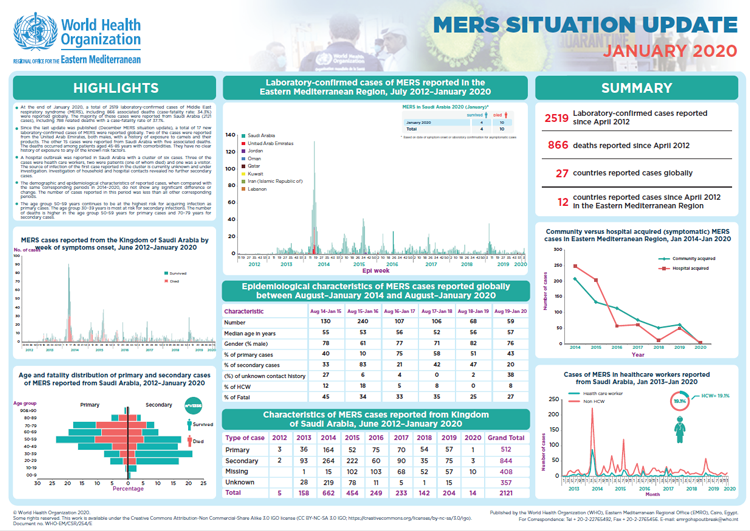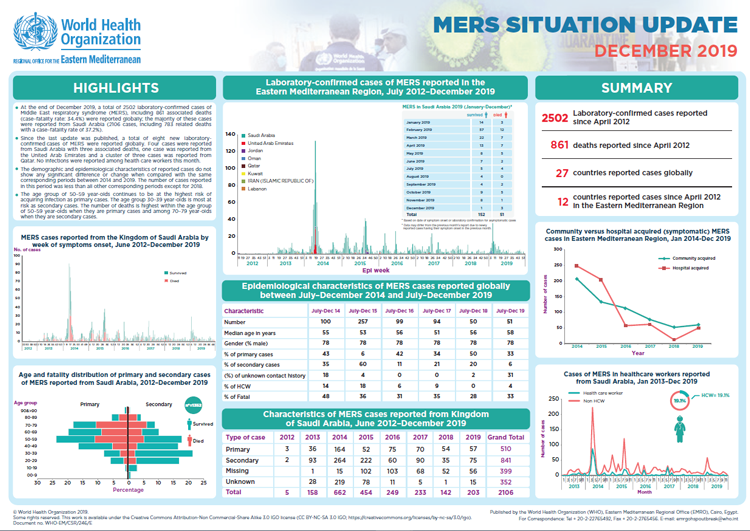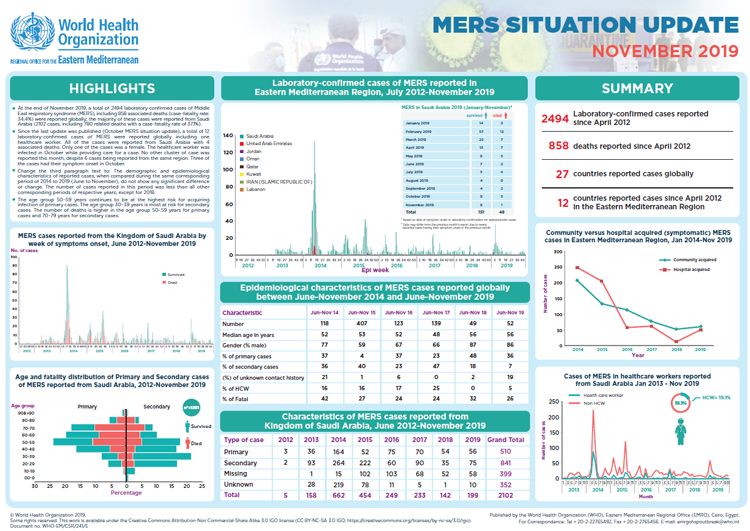MERS situation update, January 2020
 Read the situation update for January 2020At the end of January 2020, a total of 2519 laboratory-confirmed cases of Middle East respiratory syndrome (MERS), including 866 associated deaths (case-fatality rate: 34.3%) were reported globally. The majority of these cases were reported from Saudi Arabia (2121 cases), including 788 related deaths with a case-fatality rate of 37.1%.
Read the situation update for January 2020At the end of January 2020, a total of 2519 laboratory-confirmed cases of Middle East respiratory syndrome (MERS), including 866 associated deaths (case-fatality rate: 34.3%) were reported globally. The majority of these cases were reported from Saudi Arabia (2121 cases), including 788 related deaths with a case-fatality rate of 37.1%.- Since the last update was published (December MERS situation update), a total of 17 new laboratory-confirmed cases of MERS were reported globally. Two of the cases were reported from the United Arab Emirates, both males, with a history of exposure to camels and their products. The other 15 cases were reported from Saudi Arabia with five associated deaths. The deaths occurred among patients aged 45-85 years with comorbidities. They have no clear history of exposure to any of the known risk factors.
- A hospital outbreak was reported in Saudi Arabia with a cluster of six cases. Three of the cases were health care workers, two were patients (one of whom died) and one was a visitor. The source of infection of the first case reported in the cluster is currently unknown and under investigation. Investigation of household and hospital contacts revealed no further secondary cases.
- The demographic and epidemiological characteristics of reported cases, when compared with the same corresponding periods in 2014–2020, do not show any significant difference or change. The number of cases reported in this period was less than all other corresponding periods.
- The age group 50–59 years continues to be at the highest risk for acquiring infection as primary cases. The age group 30–39 years is most at risk for secondary infections. The number of deaths is higher in the age group 50–59 years for primary cases and 70–79 years for secondary cases.
Read the latest MERS update for January 2020
Subscribe to the monthly newsletter from the Infectious Hazard Preparedness unit of the Health Emergencies Programme for the latest data and analysis on epidemic and pandemic-prone diseases as well as news on outbreak preparedness and response within the WHO Eastern Mediterranean Region.
MERS situation update, December 2019
 Read the situation update for December 2019At the end of December 2019, a total of 2502 laboratory-confirmed cases of Middle East respiratory syndrome (MERS), including 861 associated deaths (case–fatality rate: 34.4%) were reported globally. The majority of these cases were reported from Saudi Arabia (2106 cases, including 783 related deaths with a case-fatality rate of 37.2%).
Read the situation update for December 2019At the end of December 2019, a total of 2502 laboratory-confirmed cases of Middle East respiratory syndrome (MERS), including 861 associated deaths (case–fatality rate: 34.4%) were reported globally. The majority of these cases were reported from Saudi Arabia (2106 cases, including 783 related deaths with a case-fatality rate of 37.2%).- Since the last update was published, a total of eight new laboratory-confirmed cases of MERS were reported globally. Four cases were reported from Saudi Arabia with three associated deaths, one case was reported from the United Arab Emirates and a cluster of three cases was reported from Qatar. No infections were reported among health care workers this month.
- The demographic and epidemiological characteristics of reported cases do not show any significant difference or change when compared with the same corresponding periods between 2014 and 2019. The number of cases reported in this period was less than all other corresponding periods except for 2018.
- The age group of 50–59 year-olds continues to be at the highest risk of acquiring infection as primary cases. The age group 30–39 year-olds is most at risk as secondary cases. The number of deaths is highest within the age group of 50–59 year-olds when they are primary cases and among 70–79 year-olds when they are secondary cases.
Read the latest MERS update for December 2019
Subscribe to the monthly newsletter from the Infectious Hazard Preparedness unit of the Health Emergencies Programme for the latest data and analysis on epidemic and pandemic-prone diseases as well as news on outbreak preparedness and response within the WHO Eastern Mediterranean Region.
MERS situation update, November 2019
 Read the situation update for November 2019At the end of November 2019, a total of 2494 laboratory-confirmed cases of Middle East respiratory syndrome (MERS), including 858 associated deaths (case–fatality rate:34.4%) were reported globally; the majority of these cases were reported from Saudi Arabia (2102 cases, including 780 related deaths with a case–fatality rate of 37.1%).
Read the situation update for November 2019At the end of November 2019, a total of 2494 laboratory-confirmed cases of Middle East respiratory syndrome (MERS), including 858 associated deaths (case–fatality rate:34.4%) were reported globally; the majority of these cases were reported from Saudi Arabia (2102 cases, including 780 related deaths with a case–fatality rate of 37.1%).- Since the last update was published (October MERS situation update), a total of 12 laboratory-confirmed cases of MERS were reported globally including one healthcare worker. All of the cases were reported from Saudi Arabia with 4 associated deaths. Only one of the cases was a female. The healthcare worker was infected in October while providing care for a case. No other cluster of case was reported this month, despite 6 cases being reported from the same region. Three of the cases had their symptom onset in October.
- Change the third paragraph text to: The demographic and epidemiological characteristics of reported cases, when compared during the same corresponding period of 2014 to 2019 (June to November), do not show any significant difference or change. The number of cases reported in this period was less than all other corresponding periods of respective years, except for 2018.
- The age group 50–59 years continues to be at the highest risk for acquiring infection of primary cases. The age group 30–39 years is most at risk for secondary cases. The number of deaths is higher in the age group 50–59 years for primary cases and 70–79 years for secondary cases.
Read the latest MERS update for November 2019
Subscribe to the monthly newsletter from the Infectious Hazard Preparedness unit of the Health Emergencies Programme for the latest data and analysis on epidemic and pandemic-prone diseases as well as news on outbreak preparedness and response within the WHO Eastern Mediterranean Region.








